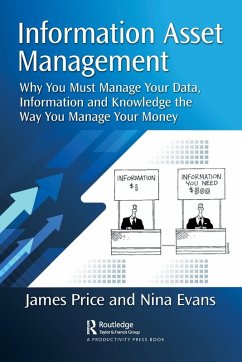Organisations are using data, information and knowledge as a competitive weapon. Their data, information and knowledge are arguably their most valuable assets. Yet, this fourth asset is managed badly when compared to the other three assets, namely money, people and infrastructure with considerable risk to the organisation. Executives are accountable for the success of their organisations, and those who don't manage this critical resource and business enabler effectively can be regarded as negligent. Information Assets carry enormous risk and value. Most boards and executives don't know how to govern and manage IAs effectively and nobody is held accountable. Given this, organisations should govern and manage their Information Assets the way they manage their Financial Assets. The benefits of managing IAs well are compelling. These benefits include increased efficiency, productivity, employee satisfaction, improved decision-making, mitigating business risk and improving product, protecting corporate reputation and service delivery. Drawing on ground-breaking research, this book explains why Information Assets are so important to organisations and the barriers to managing them well.
This book is unique in the sense that it takes a fresh look at this topic, is based on experience and research, and includes interviews from more than 70 industry leaders. In short, this book is written by executives and explains where to start.
This book is unique in the sense that it takes a fresh look at this topic, is based on experience and research, and includes interviews from more than 70 industry leaders. In short, this book is written by executives and explains where to start.
Price and Evans have produced a ground-breaking, mind-altering book on how organizations and executives need to be thinking about and approaching information in their organizations, but why they regularly fail to do so. This perhaps is the most comprehensively researched and one of the most important books ever published on the topic of managing data as an actual enterprise asset and overcoming the persistent business pathology preventing it. - Douglas B. Laney, Innovation Fellow, West Monroe Partners, and author of Infonomics and Data Juice"
If you think money, people, and infrastructure, are your only assets to manage, think again. It is impossible to manage any other asset well without managing the data, information, and knowledge which underly them and are assets in their own right. Price and Evans offer compelling arguments based on experience, the latest research, and industry leaders. Learn from them and put this book to work! - Danette McGilvray, President and Principal, Granite Falls Consulting, Inc. Author of Executing Data Quality Projects: Ten Steps to Quality Data and Trusted Information(TM), 2nd Ed. (Elsevier/Academic Press, 2021)
At a time when everyone seems to have become an instant data expert and AI genius, it's refreshing to read a rigorously researched and pragmatically laid out examination of this fundamentally important topic. In my view, it's a prime example of the Australian MBA culture (minimum bullshit allowed) in action, and needs to be on everyone's reading list. - Daragh O Brien, CEO, Castlebridge and Lecturer in Data Protection and Data Governance, UCD Sutherland School of Law.
Recognizing data, information, and knowledge as assets and treating them as such may be the single most effective way a company can improve its strategic position. And doing so is an absolute necessity for those pursuing AI.- Thomas C. Redman, Ph. D., the Data Doc, Data Quality Solutions, Rumson, NJ USA
If you think money, people, and infrastructure, are your only assets to manage, think again. It is impossible to manage any other asset well without managing the data, information, and knowledge which underly them and are assets in their own right. Price and Evans offer compelling arguments based on experience, the latest research, and industry leaders. Learn from them and put this book to work! - Danette McGilvray, President and Principal, Granite Falls Consulting, Inc. Author of Executing Data Quality Projects: Ten Steps to Quality Data and Trusted Information(TM), 2nd Ed. (Elsevier/Academic Press, 2021)
At a time when everyone seems to have become an instant data expert and AI genius, it's refreshing to read a rigorously researched and pragmatically laid out examination of this fundamentally important topic. In my view, it's a prime example of the Australian MBA culture (minimum bullshit allowed) in action, and needs to be on everyone's reading list. - Daragh O Brien, CEO, Castlebridge and Lecturer in Data Protection and Data Governance, UCD Sutherland School of Law.
Recognizing data, information, and knowledge as assets and treating them as such may be the single most effective way a company can improve its strategic position. And doing so is an absolute necessity for those pursuing AI.- Thomas C. Redman, Ph. D., the Data Doc, Data Quality Solutions, Rumson, NJ USA

